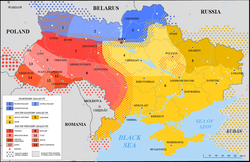West Polesian microlanguage
show This article may be expanded with text translated from the corresponding article in Russian. (July 2016) Click [show] for important translation instructions. |
| West Polesian dialect | |
|---|---|
| Native to | Belarus, Ukraine, Poland |
| Region | Southwestern Belarus, northwestern Ukraine, bordering regions of Poland |
Indo-European
| |
| Cyrillic | |
| Language codes | |
| ISO 639-3 | – |
| Glottolog | None |



The Polesian language[1] (Ukrainian: поліська мова, polis'ka mova; Belarusian: палеская мова, palieskaya mova) or dialect of Ukrainian is spoken in Southwestern Belarus, in Northwestern Ukraine and in the bordering regions of Poland. It is also considered a Slavic microlanguage by one Russian linguist.
Its composition is estimated to be 40 percent Ukrainian, 5 percent Belarusian, 5 percent Polish, and 50 percent Polesian.[1]
West Polesian dialects are mostly used in everyday speech, though attempts have been made in 1990s by efforts of Nikolai Shelyagovich (who is not a linguist) to develop a standard written language for the dialect.[2] However, his efforts received almost no support and the campaign eventually melted away.[3] In particular, writer Nil Hilevich and some others spoke against him, claiming threat to the national integrity of Belarus, which was labelled as "Yotvingian separatism".[4]
See also[]
References[]
- ^ Jump up to: a b Marek Jan Chodakiewicz (2012). Intermarium: The Land Between the Black and Baltic Seas. Vasily Ptashits (Василий Пташиц) and the Polesian nationalism. Transaction Publishers. p. 493. ISBN 978-1412847742. Retrieved 10 October 2015.
- ^ Цыхун Г.А. Пра заходнепалескую літаратурную мікрамову (праект М. Шэляговіча) (retrieved July 13, 2016) First published in: Матэрыялы навукова-краязнаўчай канфэрэнцыі “Палесьсе ў ХХ ст.” (1-4 чэрвеня, Беласток) / Укл. і аг. рэд. Ф.Клімука, А.Энгелькінг, В.Лабачэўская. — Менск: Тэхналёгія, 2001. — 320 с. — Наклад 320 ас. ISBN 985-458-034-2
- ^ Цадко О. Полесье и опыт национального конструирования (1988–1995), Палітычная сфера. Гісторыя і нацыя, no.24 (1), 2016, pp. 78-93.
- ^ Дынько А. Найноўшая гісторыя яцвягаў, ARCHE, no. 6 (11), 2000. Quote: "Аформілася і супрацьлежная партыя. Лідэры Таварыства Беларускай Мовы Ніл Гілевіч, Яўген Цумараў і Алег Трусаў (вось дзе гняздо беларускага фундаменталізму) узначалілі фронт змагання супраць «яцвяжскага сепаратызму» на старонках «ЛіМу», «Нашага Слова» і ў Вярхоўным Савеце, і «Збудінне» кляйміла іх выступы як «провокашыны лытвынських шовыныстив». Паэт Мікола Федзюкевіч усхвалявана выкрываў, што ягоныя дарагічынскія дзядзькі яцвяжскай мовы не разумеюць і што "асаблівую насцярожанасць выклікалі ў палескіх хлебаробаў наступныя радкі."
- East Slavic languages
- Slavic language stubs
